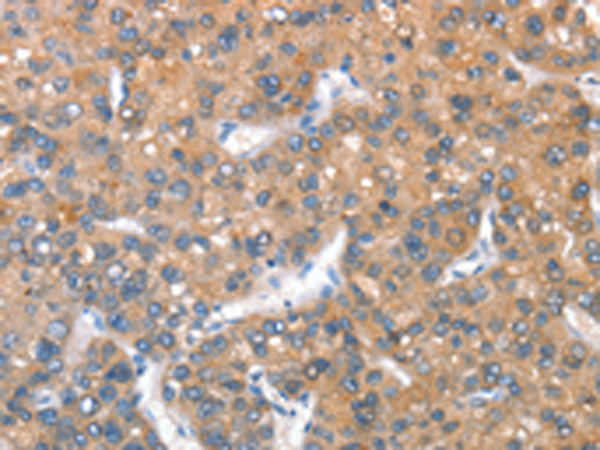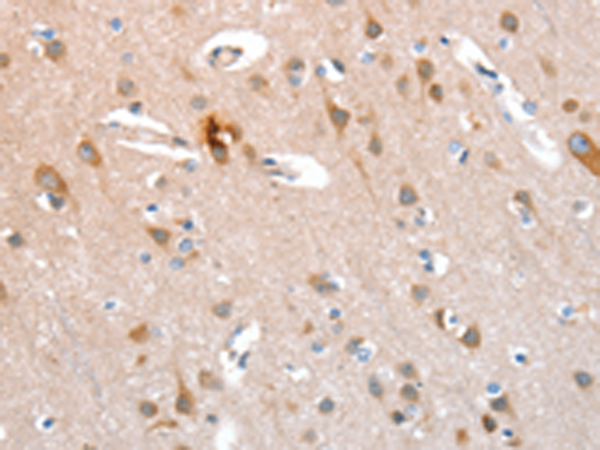

| WB | 咨询技术 | Human,Mouse,Rat |
| IF | 咨询技术 | Human,Mouse,Rat |
| IHC | 1/50-1/200 | Human,Mouse,Rat |
| ICC | 技术咨询 | Human,Mouse,Rat |
| FCM | 咨询技术 | Human,Mouse,Rat |
| Elisa | 1/2000-1/5000 | Human,Mouse,Rat |
| Aliases | ECE3; CD238 |
| Host/Isotype | Rabbit IgG |
| Antibody Type | Primary antibody |
| Storage | Store at 4°C short term. Aliquot and store at -20°C long term. Avoid freeze/thaw cycles. |
| Species Reactivity | Human |
| Immunogen | Fusion protein of human KEL |
| Formulation | Purified antibody in PBS with 0.05% sodium azide and 50% glycerol. |
+ +
以下是关于KEL抗体的3篇代表性文献摘要概览:
---
1. **"The Kell blood group system: a review"**
*作者:Reid, M.E. (2009)*
摘要:系统综述了Kell血型系统的抗原结构、分子基础及临床意义,指出KEL抗体可引发严重的新生儿溶血病(HDFN)和溶血性输血反应,强调基因分型技术对预防此类并发症的重要性。
---
2. **"Kell alloimmunization in pregnancy: management dilemmas"**
*作者:Moise, K.J. et al. (2017)*
摘要:探讨妊娠期母体产生抗KEL抗体的风险,对比抗K与抗D抗体的病理差异,指出抗K抗体可能导致胎儿贫血但新生儿黄疸较轻,需通过胎儿超声和血液学监测指导宫内输血干预。
---
3. **"Molecular basis of the KEL1/KEL2 polymorphism of the Kell blood group system"**
*作者:Lee, S. et al. (2003)*
摘要:通过基因测序揭示KEL1(K)和KEL2(k)抗原的分子差异,证实KEL1抗原由单核苷酸突变(C698T)导致,为开发特异性检测抗KEL抗体的分子诊断方法奠定基础。
---
4. **"Hemolytic transfusion reactions due to anti-KEL antibodies: a case series analysis"**
*作者:Westhoff, C.M. et al. (2015)*
摘要:分析12例因抗KEL抗体导致的急性或迟发性输血反应病例,强调在输血前扩展抗原匹配(尤其是高危人群)的必要性,并讨论现有抗体筛查流程的潜在漏洞。
---
这些文献涵盖了KEL抗体的基础研究、临床管理和检测技术,适用于输血医学或产科领域的研究者参考。
The Kell (KEL) blood group system, first identified in 1946. is a clinically significant antigen system encoded by the *KEL* gene located on chromosome 7q33. The KEL glycoprotein, a type II transmembrane metalloprotease, plays a role in cleaving endothelin-3 and other bioactive peptides. KEL antigens, including K (KEL1) and k (KEL2), are highly immunogenic, triggering antibody production upon exposure through transfusion, pregnancy, or transplantation. Anti-K antibodies are particularly notable in transfusion medicine and obstetrics due to their association with severe hemolytic reactions, including hemolytic disease of the fetus and newborn (HDFN).
Unlike the Rh system, KEL antigens are expressed early in erythropoiesis, making them targets for immune-mediated destruction of red blood cells. Anti-K is the most common immune antibody outside the ABO and Rh systems, with ~10% of incompatible transfusions leading to alloimmunization. In pregnancy, maternal anti-K can cause fetal anemia by suppressing erythropoiesis and lysing K-positive fetal cells. Detection of KEL antibodies relies on serological methods like indirect antiglobulin testing, while molecular genotyping aids in risk stratification. Prophylactic measures, including antigen-matched transfusions and antenatal monitoring, are critical in managing at-risk patients. Research continues to explore KEL's biological roles and strategies to mitigate antibody-mediated complications.
×